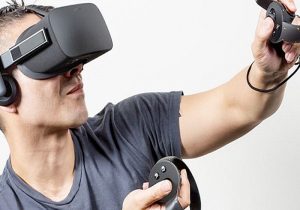 According to SuperData Research in 2016, investment in Virtual Reality (VR) will be $3 Billion. This is up from $1.9 Billion in 2015. Consider 60% of investment funds target Gaming Development. Other investment funds target immersive and cinematic VR. With this level of investment, the future use of virtual reality will almost certainly become a main stream enjoyment for consumers and businesses.
According to SuperData Research in 2016, investment in Virtual Reality (VR) will be $3 Billion. This is up from $1.9 Billion in 2015. Consider 60% of investment funds target Gaming Development. Other investment funds target immersive and cinematic VR. With this level of investment, the future use of virtual reality will almost certainly become a main stream enjoyment for consumers and businesses.
It was not that long ago when the Kickstarter debut of Oculus Rift VR product crowdsourced $2.4 million in 2012, which two years later was acquired by Facebook for $2 Billion. Subsequently, the current year saw the release of Oculus Rift product to retail consumers in late March 2016 (cost $599). Additionally, Oculus VR software is driving the experience on the widely consumer marketed GearVR product (Cost $99) that is compatible with Samsung GALAXY flagship smartphones.
What about content, games, software? Consider in 2015 alone, 175,000 Oculus Rift Development Kits shipped globally to developers. Consumers and businesses will reap the benefits over time from the imaginations and creativity put forth by these developers.
Aforementioned facts are remarkable and suggest another crossroad is upon all technology consumers, much like the arrival of smartphones and video capability less than a decade ago. Now, smartphones are carried regularly in pockets or purses, millennials and youth can barely put them down these days. It’s highly likely that a decade from now, many homes will have more than one VR Technology product conveniently near the couch for viewing pleasure. Only time will tell what happens to demand for large flat screen televisions, when one can immerse themselves into a different reality, such as live sports, concerts, and movies.
How about the workplace and educational institutions? Sources reveal that virtual reality is already being funded in academic and research and development centers. One example is VR technology in the medical and surgical fields, such as in the form of surgical simulation.
Beyond the gaming designed experience will be Immersive VR, which provides the viewer the experience to be inside a live or pre-recorded 360 degree experience. iHeart Radio and Universal Music Group announced in 2016 that Immersive VR will be launched, allowing viewers to attend certain portions of concerts and music events. Cinematic VR is gaining momentum in Hollywood as producers and motion picture companies determine how movies will be created and enjoyed in the VR platform.
What does all this mean to you? More change and innovation awaits us. The eventual day will come when you own VR technology, and you readily slip into a different reality, whether for pure pleasure or learning new professional skills.
